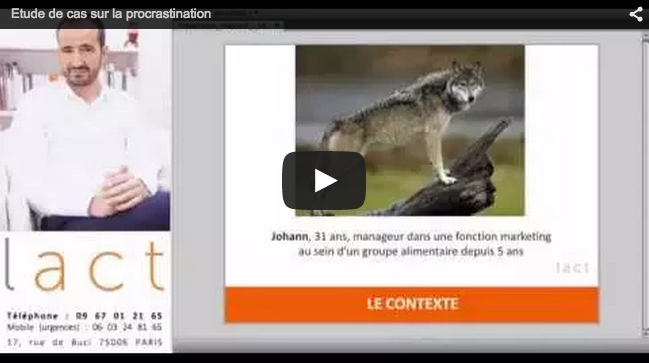Context
John is 31 years old. He's been a marketing manager in a food group for 5 years. It has in its attributions the regular production of reports which it constantly postpones until tomorrow. And meanwhile, he does something else….
However, he sets deadlines for himself to get started, draws up lists, does relaxation exercises, surfs the internet, lets himself be distracted by an article in the professional press, goes for a coffee or even talks with a colleague of the famous reporting.
And he always says to himself “I have to get started”.
His supervisor obviously comes to see him and asks him where he is. He assures her of the progress of the work: "it's in progress" he says inevitably.
This situation of course creates tensions between them.
When he returns home in the evening, he thinks he can finally do what dragged on so long during the day. But he is monopolized by his family, without being as available as she would like, which creates other forms of tension.
Historically, thanks to his experience, he knows that he has resources and that he always ends up under pressure producing these reports.
But it is painful, laborious. He always promises himself to do better next time. “Why am I like this? ". And so saying, he ends up doubting his ability to take on new responsibilities, supports less and less pressure, becomes more and more stressed.
He then goes to see the company's occupational physician who directs him to our office.
Situation analysis
Johann is in constant conflict between writing the report and doing something else.
He promises himself to “do it later”, which is part of a logic of control.
At the same time, he develops the belief that he has no will. “I am definitely incapable of getting myself to do what I have to do”.
The trap
Johann has a hope based on history. "Yes, he is capable of doing" but his strategy is to do it later. And he always delays the moment to get started. He is in a dynamic of procrastination.
But he tells himself that if he can't get started, it's because he doesn't have the will.
The hope of being able to do sows doubt in him, multiplies disillusionment and leads him to personal questioning: “Why am I like this? ".
What LACT did
-
Aversion and disaster scenario
We carried out a diagnosis in one session followed by 5 coaching sessions; in all, 6 sessions were therefore necessary and sufficient.
Our strategy has been to create an aversion to Johann's dysfunctional strategy of ineluctably postponing getting to work.
We have built a disaster scenario connected to the pain of having less and less courage, initiative and creativity.
-
Strategic reframing
We talked about the mountain represented by the production of reports and the way in which Johann looks at the summit instead of focusing on the horizon.
We compared his situation to that of a climber who, instead of fixing his eyes on the top of the mountain, must be careful to set his hooks one by one in order to climb the slope gradually, in complete safety.
-
Prescription
We gave Johann the injunction to turn obligation into opportunity:
- Gather first the information necessary for its reporting
- To "drag" to his work table and choose to do or not to do.
- Stay there only 20 minutes, with the prohibition to exceed these 20 minutes
- In case of overrun, prohibition to go back to it for 5 days
- Make a self-diagnosis of this phase
The effects obtained
Johann can now produce his reports more serenely.
Even if he still doesn't like this task, it requires less effort
Relationship tensions eased
Johann has a greater capacity to be voluntary, to show initiative.





